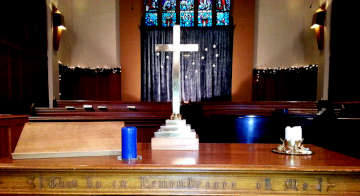
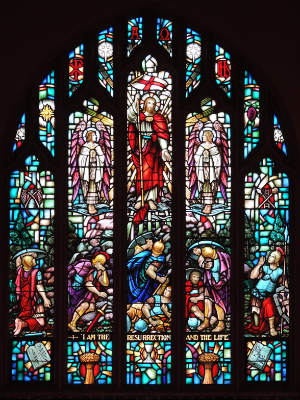
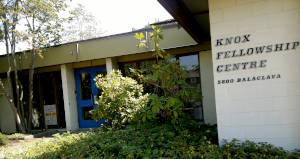
– started 2013 – ongoing
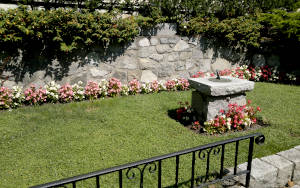
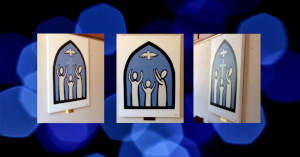
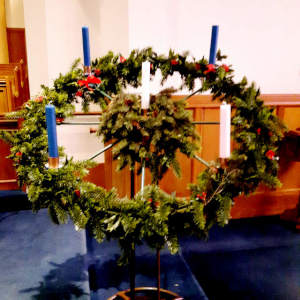
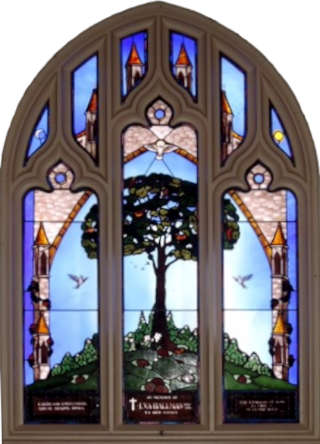
In the summer of 1910, a student minister, Mr. David Gray, was delegated by Presbytery to establish a missionary charge in Kerrisdale, which at the time had no local churches. Kerrisdale was then a small residential area in the Municipality of Point Grey, long before this district became part of the City of Vancouver. The first services were held at the home of Mr. & Mrs. W.L. Ross on Wilson Road (now West 41st Avenue ) and in a few weeks temporary accommodation was secured in the Wilson Road Public School. The new charge was first named Kerrisdale Presbyterian Church but within a few years was renamed Knox Presbyterian Church after John Knox, the Scottish religious reformer. At the first communion, December 2, 1910, ten members took part.
By November 1911, the Sunday School building in the new community was completed and occupied, on the southeast corner of West 42nd Avenue and MacDonald St., a frame building seating about 250, with a full basement. This served the needs of the congregation until 1927 when a new and larger Sunday School and gymnasium building was erected in the 5600 block of Balaclava Street, suitable also for church purposes until such time as a separate church could be erected. The move west, out of the immediate area, was prompted by Knox’s close proximity to Ryerson, a former Methodist church which, (along with Knox), became a part of the new United Church of Canada in 1925. The existing Knox Church building was completed on the Balaclava site in 1948. On September 13, 1970, a modern Fellowship Centre was opened beside the church sanctuary. In 1975, when a fire destroyed the old original building on the site, a multipurpose building and kitchen were added to the Fellowship Centre.
Today the Knox Sanctuary is a designated heritage building, while the Fellowship Centre serves many church and community needs, such as Playschool, Scouting and an Education Centre. It also provides meeting and rehearsal space for many arts activities and community groups. As a caring and enthusiastic Christian congregation, Knox is dedicated to reaching out to meet the spiritual and physical needs of our local and worldwide community.
Faith, Nation, and Compromise
(The Story of the United Church of Canada, Being Christian and Being Canadian )


June 10, 1925 presented a resolute act of unity, the United Church of Canada was born. It was a day that blended deep faith with civic spirit. A moment when religious conviction and national character, merged in a uniquely Canadian way.
At its heart, the creation of the United Church was an act of compromise. And not the hollow, reluctant kind, but the richer, more hopeful version, where sacrifice is shared and the future is forged together. The Church’s formation speaks not only to Christian values but also to the essence of Canadian identity.
The Spirit of Unity
In the early 20th century, Canada was young, diverse, and searching for coherence. So were its Protestant churches. The Methodist Church, the Congregational Union, and two-thirds of the Presbyterian Church that chose to come together; not out of convenience, but out of conviction. They believed that together, they could better serve their communities, witness to the gospel, and build a national church that reflected both spiritual and social unity.
It was no easy decision. These denominations held different theological emphases, governance structures, and cultures of worship. The discussions took years. Emotions ran high. In some Presbyterian congregations, church buildings split with one side supporting union, the other resisting union.
Compromise, when guided by love and humility, can be an act of courage. In 1925, the founding of the United Church of Canada was just that. A courageous compromise, grounded in Christian unity and a uniquely Canadian willingness to find common ground.
Christianity and Compromise
Jesus’ teachings are filled with paradox and reconciliation. “Blessed are the peacemakers,” He said in the Sermon on the Mount. The early church was built not only on faith but on negotiation. Consider, Jews and Gentiles, Paul and Peter, tradition and new revelation, all wrestling toward a shared truth.
To be Christian is to seek reconciliation, to bear with one another in love, and to be the body of Christ, even amid differences. Compromise here isn’t weakness but rather it’s discipleship. It’s the daily, difficult work of grace.
Canada: A Country of Compromise
Canada, too, is a nation born of compromise. Confederation in 1867 was a balancing act of languages, regions, and cultures. Our parliamentary democracy prizes consensus more than conflict. Multiculturalism, bilingualism, Indigenous reconciliation are, all ongoing Canadian stories, rooted in the belief that people with different realities, can live together in mutual respect.
In a country built on treaties, dialogue, and the coexistence among various cultures, listening is essential. Similarly, in Christianity, listening, especially to those we disagree with, is part of loving our neighbour.
In Canada’s ongoing reconciliation with Indigenous peoples, we see a national struggle to reckon with the past. It’s messy, imperfect, and long overdue. Even here, we glimpse the difficult grace of compromise: acknowledging truth without losing hope, pursuing justice without vengeance.
Christianity speaks to this too. Forgiveness is not forgetting; it’s choosing to move forward without carrying the weight of hatred. It’s a spiritual compromise, by sacrificing the right to retaliate in favor of healing.
The joke sometimes is that Canadians are “too polite,” but behind that politeness is a profound ethic; a belief that listening matters, that difference isn’t dangerous, and that peace is something you make, not just find.
Community Over Individualism, On Moving Forward
Both Canadian and Christian identities are rooted in community. The Canadian commitment to public healthcare and social responsibility echoes the Christian call “to bear one another’s burdens” and fulfill the laws of Christ (Galatians 6:2). In both ways, living in community requires compromise, to balance personal freedoms with collective good.
It’s no coincidence that Canada’s social systems work best when individuals are willing to sacrifice some self-interest. Likewise, Christianity calls for selflessness: to forgive, turn the other cheek, share what we have. These aren’t easy virtues. They require daily compromises of ego, pride, and convenience.
The United Church: Where Faith and Nation Meet
The United Church of Canada has always been more than a religious institution; it has been a moral voice in the public square. From social justice to Indigenous solidarity, from gender equality to environmental stewardship, it has tried to live out a faith that is both humble and bold.
In doing so, the United Church mirrors both Christianity and Canada: welcoming, diverse, and willing to wrestle with hard truths for greater unity.
A Century Later
As we mark the centennial of the United Church, we’re reminded that compromise is not the end of conviction. To be Christian is to seek peace with neighbours; believing that peace is possible. Neither Canadian nor Christian strength is loud. It does not need to be. There is a quiet resolve in both. And the United Church stands as a living symbol of both.
In a world where division feels louder than unity, the story of June 10, 1925, matters more than ever. It says: we can choose to come together. We can build something new. Perhaps even revealing that, the most faithful thing we can do is to meet somewhere in the middle, navigating the world with both conviction and compassion.
Annual Program Donations provide the life blood of program meaningfulness. It makes planning and resource allocation possible.
Respecting the wishes of each provider allows direction to a program, ministry, combination or to general operations.
Find Knox
5590 Balaclava Street
Vancouver, BC
V6N 1L1 Canada

